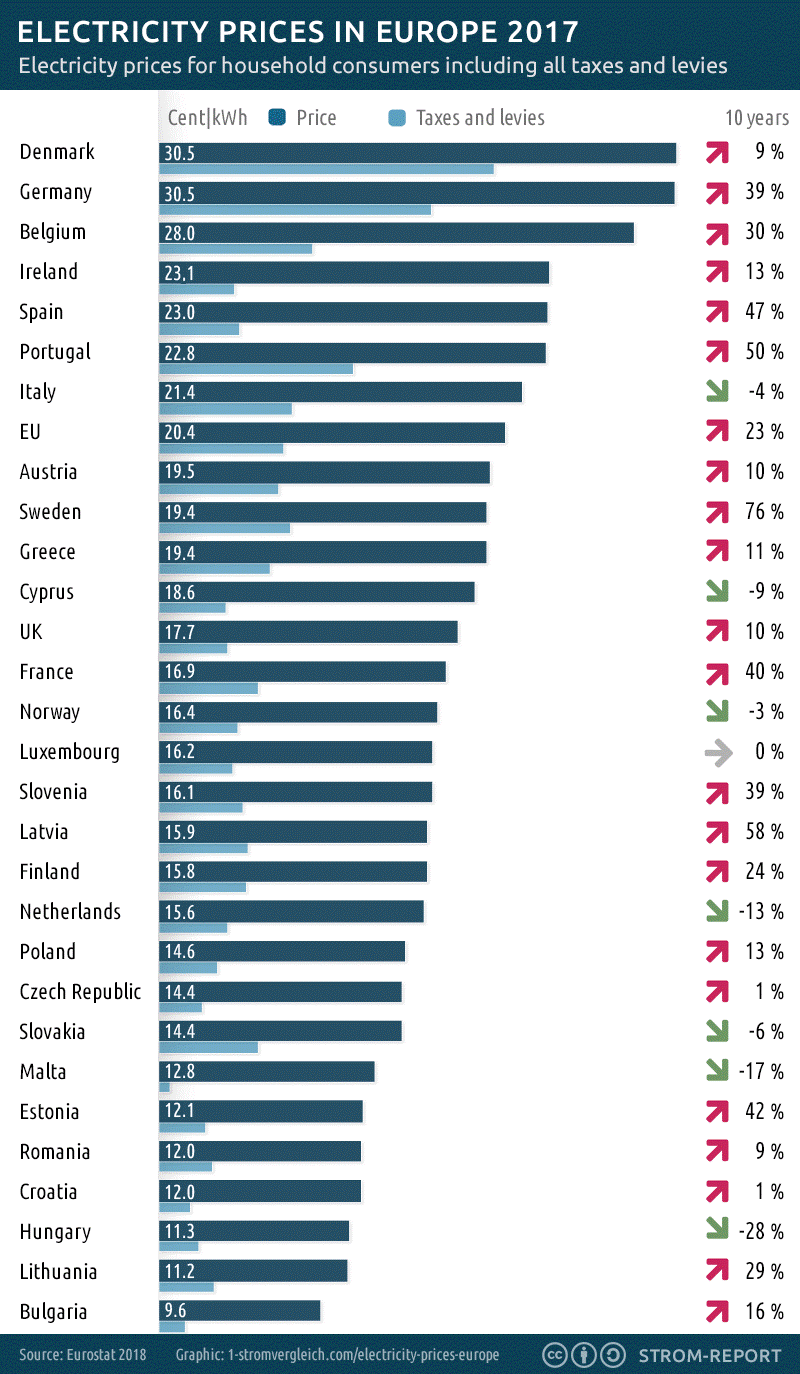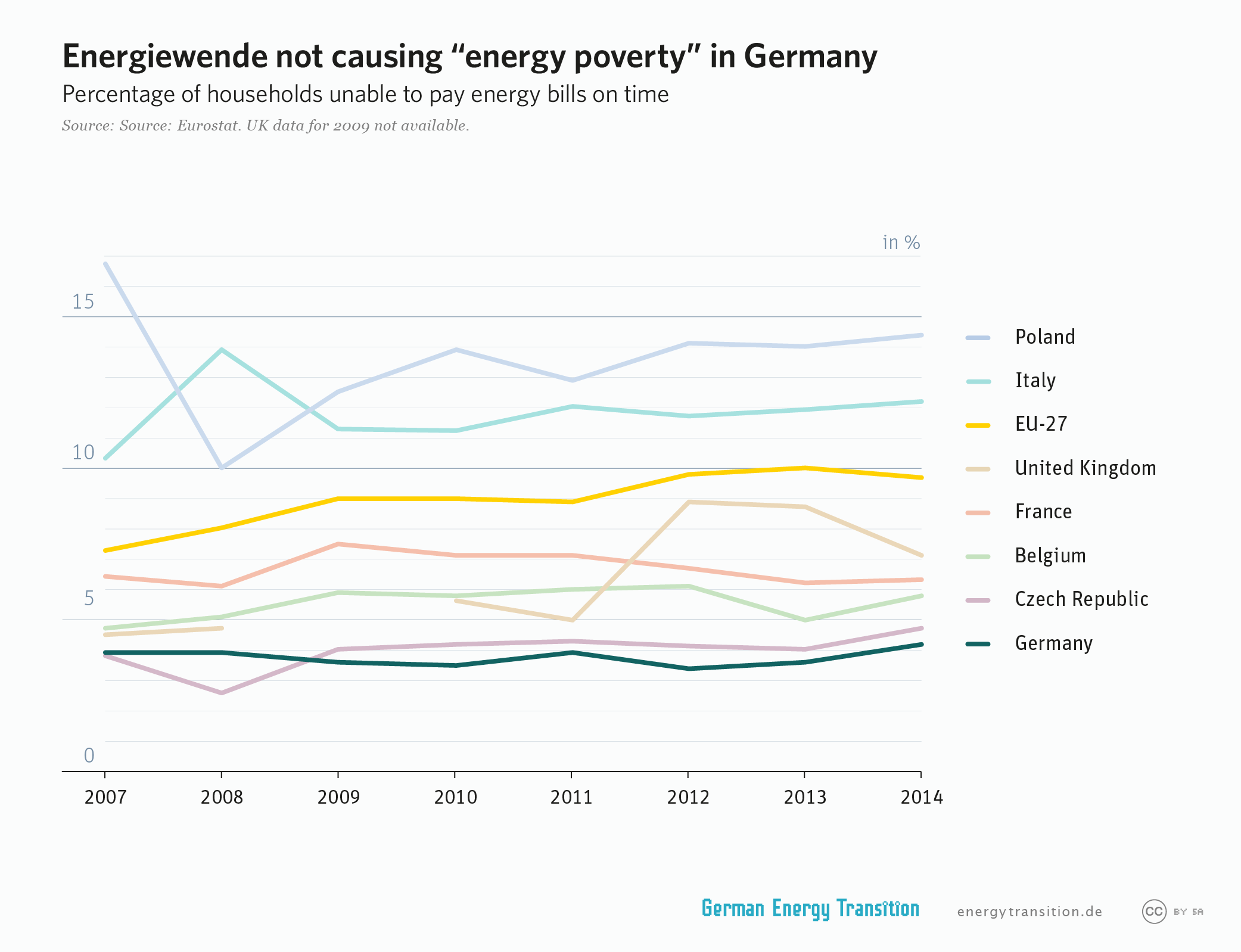According to the most recent data, German retail power rates are the highest in the EU along with Denmark’s. The monthly power bill is, however, exaggerated in reports. Craig Morris investigates.

Average German power bills are consistently overestimated (Public Domain)
After years of coming in second behind Denmark, Germany has apparently closed ranks and is now tied with the Danes in the unpopular competition for the highest retail power rates in Europe. According to “Strom Report” (based on Eurostat data), Danish and German retail consumers paid 30.5 Euro cents for a kilowatt-hour of electricity in 2017.

Source: Strom Report
However, the numbers are estimates; slightly different ones are also circulated. Consumer portal Verivox, for instance, put the average price in 2017 at 28.18 Euro cents (in German). Whatever the exact number is, Germany is certainly near the top.
Estimates for the average power bill are also circulated but seem systematically exaggerated. For instance, the German article linked to above comes to a monthly power bill of 93.93 euros based on 4,000 kWh of consumption annually. That figure is even higher than the usual 3,500 kWh annually for a “three-person household” – the metric usually used by German utility umbrella organization BDEW (in German).
Both estimates are significantly too high
Germany has an estimated 41 million households and a population of 82 million people, putting the average number of people per household at exactly two. A three-person household is larger than the average.
More importantly, the number of kilowatt-hours consumed in residential buildings is also considerably lower. In the chart below, we see that German households consume some 130 TWh of electricity annually. Divide that by 41 million households, and you get 3,171 kWh. At 30.5 Euro cents per kilowatt-hour, the average German household thus spends 967.07 euros on electricity annually – and 80.59 euros monthly.
Now here’s the fun part: the EU does not gather statistics on monthly residential power bills, so we cannot easily compare. “Strom Report” tries to put the matter into context using the data available, so we see that German retail power prices (not bills!) are in the middle of the field once account is taken of purchasing power. But even that comparison does not take account of actual spending – the bills, not just the prices. I have also written here about households not being able to pay their energy bills, and once again Germany does not perform so poorly. And note that “energy bills” concern more than just electricity: heating oil, natural gas, etc.
For comparisons of average German power bills with those in other countries, you would therefore have to perform the entire calculation above for each country: find out the amount of electricity consumed by households, divide that by the number of households, and then multiply that amount by the price.
It’s rather exhausting work – more suitable for a complete study than a blog post – so I merely refer you to our comparison of German and US power bills with data from 2013. With generally the same creature comforts, German power bills are roughly in line with those in the US after an adjustment is made to remove consumption for air-conditioning, which German households don’t have (or need).
Why is all this so important?
The distinction between prices and costs (bills) is crucial because high prices are an incentive for efficiency and conservation, both of which are integral to the energy transition. Obviously, the debate about retail power rates in Germany is contentious. Specifically, energy-intensive industry is partly exempt from grid fees and the renewables surcharge, leaving households to shoulder more of the burden. The design of power prices in Germany is not ideal, and there are good arguments to be made for lowering the retail rate in particular.
But high prices are not the end of the world either, at least not in wealthy countries like Germany. For instance, roughly three quarters of the price paid for gasoline in many European countries is taxes. High prices at the pump have steered consumers towards more efficient cars, as a comparison with the US shows. Likewise, Germans pay more attention to power consumption when purchasing appliances because they know that their power prices are high.
However you come down on the issue of how high electricity rates should be, I think we can agree on one thing: German media and utility organizations should stop overestimating the average monthly power bill in Germany.


We knew that German households don’t pay much per month for electricity, because they heat with gas. But for a full energy transition, gas heating has to be replaced by electricity (plus insulation to lower the energy requirement). The rather strange policy of taxing household electricity use is a deterrent to the needed investments.
German houses don’t have air conditioning. I’ve just bought two mini-split a/c units for my house in Spain, essentially for heating not cooling. Modern a/c units are heat pumps, multiplying the electric input by three for both functions. There are other approaches to heat pumps, but a/c is one. Consider encouraging it.
This is a fairy tail in terms of heating that people tell themselves because they do not know better or that fossil fuel industry lobbyists have been spreading.
I pay around $0.30 per kWh with an annual bill of about $180 and associated appliance consumption of about 600kWh. Recently I decided to add heating to this since my energy is 100% renewable and my consumption average has been steady for a long time. That will probably add another 1000 – 1500kWh (worst case 3350kWh if I were to heat for 12 hours over 180 days in the year which seems unlikely) thus placing me most likely at about 2000kWh with heating (21-24c Thermostat setting which I find very pleasant, the residence is about 170m3).
This was done without any “installation”, just by the use of Mica radiative heating technology which is very simple, light, durable and efficiently heats through convection and volumetric energy transfer throughout a substantial portion of a normal room. That’s why it’ll increase the temperature by 3-4 degrees in just 15 minutes or less depending on the size of the room after which it disables completely and continues to emit heat for a while. It also works almost instantaneously when it heats instead of wasting heat for large metal elements like standard radiators.
The cost of the above is actually considerably lower than if I were to heat with the available fossil fuel, those heating costs alone are around higher than my combined energy costs with electric heating. At the end of the day, my heating and general appliance energy cost is, wait for it, about $600.
That is what is possible with modern technology and intelligent energy use. People keep whining about absolutely nothing.
Some correction to the above. My generally low consumption skewed my impression of these heaters. Where the average in my building is about 4200kWh per household per year, this is only about 2000kWh for my household. So while the above is more or less true, I will likely consume 2000kWh-2500kWh for heating electrically with a total annual electricity consumption of about 3000kWh, a heat pump could reduce this considerably since the heat energy provided is generally >=3x greater than the electric energy input and would be substantially cheaper than fossil fuels in my region.
In my case, there will be additional costs for the electric heaters compared to similar use of the standard system but since my consumption is quite low, these costs will probably not be higher than the average costs of anyone here heating with fossil fuels. In fact, since I also undertook some energy saving and quality of life improvement measures in terms of hot water use, my expectation is that the amount reimbursed to me after the annual bill is calculated will be similar or greater than the amount I pay for general electric heating in my home.
DESTATIS – the official statistics – confirms the numbers from “Stromreport-Stromvergleich”, I think they simpy coppied them:
https://www.destatis.de/DE/Publikationen/Thematisch/Preise/Energiepreise/EnergiepreisentwicklungPDF_5619001.pdf?__blob=publicationFile
(see page 48)
I can reassure you that these prices (or costs?) given by DESTATIS are BS.
I live in Ireland and no one here pays € 0.23/kWh (DESTATIS) unless being extremely old and illiterate and easily duped.
And my relatives in Germany never paid € 0.30/kWh(DESTATIS)
These prices quoted by DESTATIS and Stromvergleich are for the so called “Grundversorgung” I think, that is in English the “base tariff”.
And this base tariff is the highest possible price from a German power utility one can get.
The average consumer has about 100 providers/utilities to choose from depending where he lives in Germany with about 1000 tariffs (!) on offer.
The “Grundversorgung” is always the highest tariff from the utility and all utilities give rebates.
I’m unsure what it means that your ‘relatives never paid € 0.30/kWh’. They paid more… less….? Anyway, my kWh price is exactly 29.95 cents / kWh – close to the average shown here in the graphs above. Factoring in the monthly Grundpreis (€7.75 / month) my kWh price works out to be 34.97 cents.
BTW – I am also one of those guys using Verivox to find the bet price each year when the contract comes up for renewal, so I’m not sure it can be found too much cheaper elsewhere.
The high price is however a disincentive to switching to EVs or heat pumps. The energy tax on natural gas used for heating seems to be 0.55 cent/kWh, and the heating oil tax is also, I think (I haven’t performed the necessary heat content conversions) modest compared to the electricity taxes. It would be psychologically beneficial if the significant efficiency improvements for EVs and heat pumps also translated to a real cost saving.
A simple method to reduce the metered electricity is a ‘guerilla PV installation’ a plug-and-play system.
This would reduce at least the daytime grid power, if fixed vertically esp.in winter time:
http://www.dgs.de/news/en-detail/151217-balkonkraftwerke-buergerrecht-statt-grauzone/
machine translation:
https://translate.google.com/translate?sl=de&tl=en&js=y&prev=_t&hl=en&ie=UTF-8&u=http%3A%2F%2Fwww.dgs.de%2Fnews%2Fen-detail%2F151217-balkonkraftwerke-buergerrecht-statt-grauzone%2F&edit-text=
The deterrent to EVs is a big point. In the USA, anecdotally a fair number of EV buyers also have solar panels, and see their cars as self-reliant “citizen mobility”. An economist would say there is no connection, apart from a tiny number of full-on autarks. The marginal supply of electricity is from the grid, essentially at night when the car is charging. By all means do both, but the cost calculations are independent. But economists don’t capture what people feel, and in this case they feel that both are part of one sustainability project.
Craig: please write about citizen autonomy and evs! Germany is backward here, not a leader.
Germans cook and heat their homes with natural gas. More natural gas is used this way than in electricity generation. Germans consume almost 4 times more natural gas per capita than Americans.
Switching to electricity will increase Geman electricity bills. Also, electrification of transport will add to household electricity consumption. Electric car that is driven 15-20 000 km annually will increase average current German household electricity consumption by 50%
Right.
Most dependent on gas are the Netherlands as far as I know, the household electricity costs half as much as in Germany.
https://www.platts.com/latest-news/natural-gas/london/earthquake-with-20-magnitude-hits-groningen-gas-26889179
I, as an (Eastern) German, have never even seen a gas stove in my 35 years on earth – not in the shop, not at friends’ houses. My parents threw out their old propane-powered one as a potential health hazard when I was born. (Leaking gas would collect on the floor, possibly asphyxiating a crawling baby.)
I agree about the heating though. So far, it makes a lot more financial sense for us to crank up the central heating for the whole house rather than switching on an electric radiator or heated fan in the specific rooms we’re actually using. Gas is just that much cheaper per kWh.
In Ukraine gas cost 25 euro cents.